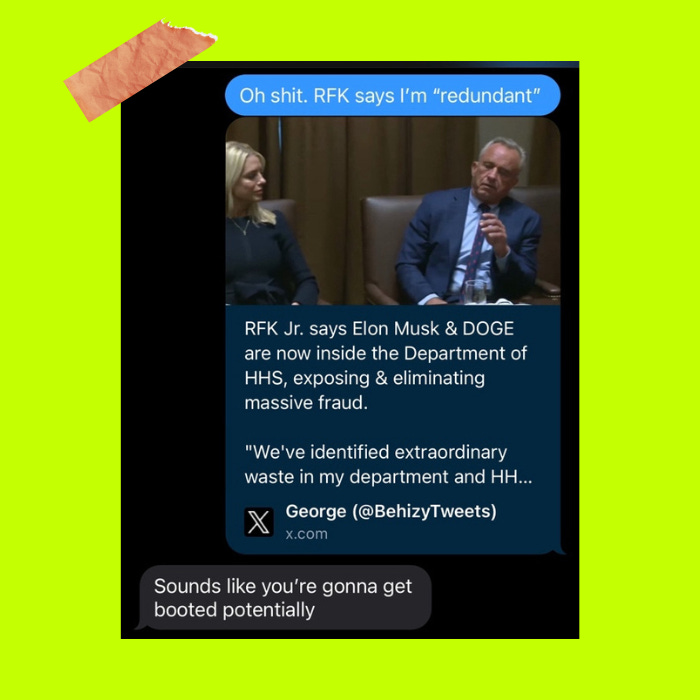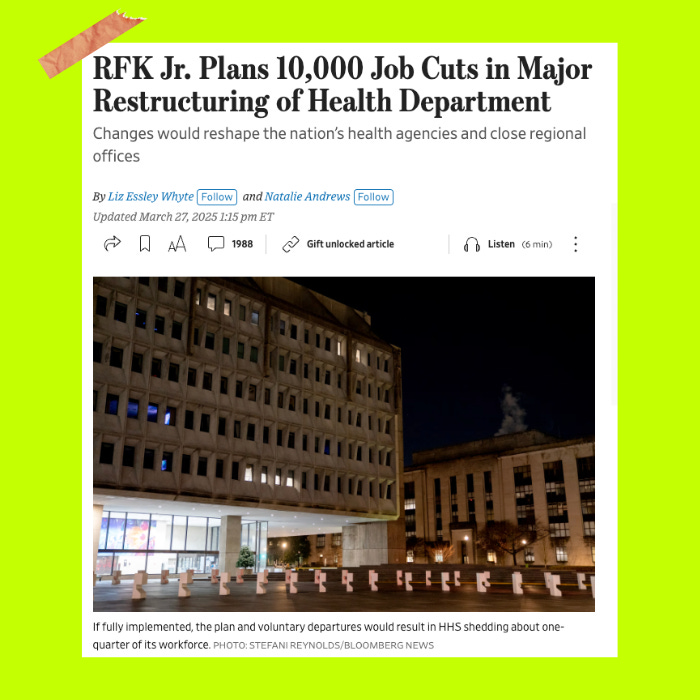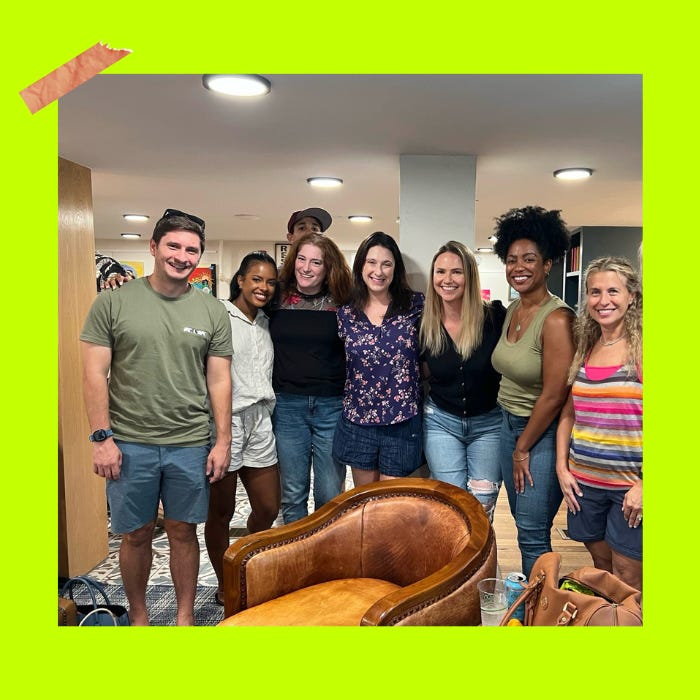Laid Off: FDA's Health Communications Specialist
"I've heard it's eerie. Buildings with hundreds of employees now hold a few dozen. They can't even share information internally because whole offices have just disappeared."
Laid Off is the coolest place on the internet to talk about being laid off.
Want to reach 8k+ smart and cool readers while also treating people on the job hunt to a coffee/tea? I’m launching Laid Off classifieds! You can read more about how they’ll work here, and if you’re interested in sponsoring a future issue, fill out this form.
🎧 PS: I spoke to
on the Never Post podcast this week about the anatomy of a layoff post and how LinkedIn is kind of like Instagram’s corporate cousin giving us accomplishment FOMO. Check it out. I say “like” a lot.In today’s issue, I talk to Alex Saint, a former health communications specialist at the Food and Drug Administration (FDA) who was laid off a few days shy of her four-year work anniversary. Her office published all the drug labels for every prescription and over-the-counter drug in the country. They were all cut.
On Thursday, March 27th, the Wall Street Journal reported that the Trump administration would be laying off 10,000 HHS employees.
Alex Saint, who had been working at the FDA for nearly four years, said they weren’t sure how real it was until DOGE released a video of RFK Jr. talking about the layoffs. At that point, their union was informed that layoff notices would go out the next day.
In the video, RFK Jr. specifically called out the number of communications offices in HHS, Alex told Laid Off. She said that while she’s not new to working in communications, she’s had some of the fewest years as a federal employee for her division.
“I knew I was on the chopping block.”
Federal employees waited for four days, and then it was announced that HHS had made a mistake with some of the layoff calculations. Alex called the delay “unusually cruel.”
On Tuesday, five days since the WSJ leak, layoff notices were sent out over email at 5:14am. Everyone, all the way up to the highest senior leadership, found out who was cut at the same time.
Alex said that there were rumors going around that the layoff email would trigger a countdown timer to lock them out of their systems, so she tried to inform all of the departments she reported to as quickly as possible.
“As I was putting this together, I got an email from my supervisor confirming everyone in our division had been fired,” Alex said. “I struggled to find the words to explain to the people who depended on me that no one is left to help them, or to complete the projects we had in progress.”
What reasoning did they give for laying you off?
The paperwork said "to reshape the workforce of HHS". Which tracks. Whether or not it's reshaping it for the better is a matter of debate.
Where were you when you found out?
The notice went out so early that I hadn’t yet started my 2.5 hour round trip commute on the DC beltway, so I found out at home. Some of my colleagues were not so lucky and found out when they showed up and their badges didn't work, and they were escorted out by security.
My husband was still asleep, so I woke him up and let him know my notice finally arrived. We had about five minutes to process what this meant for our family before the chaotic tornado of our two young kids waking up took over the house.
Looking at your LinkedIn post, there are over 100 comments of people outpouring their support and sympathy. What was it like, to get that kind of response?
The response was overwhelming and completely unexpected. I never post on LinkedIn, but it was the platform I had available to me. My story got over 430,000 impressions and hundreds of comments and reposts. It's a tremendous honor to tell the story of the unseen work of my colleagues. Public health done well is invisible. But what I found particularly encouraging is that, even this deeply polarized political environment, almost every single person who interacted with my post was kind, sympathetic, and wished us well.
I've spoken with a few other probationary workers laid off, and they all voiced a similar experience: that they were told their work was "not in the public interest." They also all disagreed with that. Can you share the work you did to serve the American public? What the consequences are of defunding that type of work?
When fully staffed, the communications office for FDA's Center for Drug Evaluation and Research, or "OCOMM" as we call it, had 130 employees. Today, there is 11. In 2024, OCOMM fielded over 42,000 public inquiries, at an average of 814 per week. 70% of those are from members of the public like you and me; not pharma, not medical professionals. We took over 10,000 "Medwatch" reports, which is a safety report where someone has a serious and even fatal side effect from a medicine. We held more than 50 webinars and conferences, where FDA subject matter experts could teach people around the world, in subjects like how prescription medications can cause interactions with cannabis, or how to alert the FDA about a safety issue.
We notified the American people, and the world, about safety issues. Eyedrops that could blind you. Liquid morphine for NICU babies that was accidentally 25 times stronger than it was supposed to be. Guidance on what doctors and patients could do when their drug was in shortage. There is no one left to do any of that now. The DOGE chainsaw left 11 people to try to answer the phones, but no on for them to get answers from.
Our team manages the FDA's websites. Publishes all the drug labels for every prescription and over-the-counter drug in the country. We help the White House and Congress answer letters from the public about medications. We notified the American people, and the world, about safety issues. Eyedrops that could blind you. Liquid morphine for NICU babies that was accidentally 25 times stronger than it was supposed to be. Guidance on what doctors and patients could do when their drug was in shortage. There is no one left to do any of that now. The DOGE chainsaw left 11 people to try to answer the phones, but no on for them to get answers from.
What has it been like to see the federal government layoffs make headlines? To see a very personal experience written about by major news outlets?
I've done communications and media relations for 15 years, but I've never been the subject, so having this attention on me personally has been unsettling and new. But I took an oath to serve this country and the American people. I know the danger every American will face if they have no one communicating public health information to keep themselves and their families safe. So if it can make a difference and get my colleagues reinstated, it is worth it to me. My biggest concern is that the second Trump administration has been, quite effectively, "flooding the zone". There will be new stories soon for media to cover, but the danger to the public will not go away until we have enough staff to effectively communicate public health information to 340 million people.
What was the vibe like at the agency in the weeks leading up to the layoffs? How did the day-to-day change since the new administration took office?
For someone whose talking point is "radical transparency", it was shocking to see the censorship and restrictions begin on day one. Before the second Trump administration took office, the FDA centers had almost free reign to communicate with our stakeholders. If they needed to know, we were the trusted experts to get it done. Even under the first Trump administration.
By the time they fired the communications staff, every single thing that was going to go external had to be approved by the HHS Assistant Secretary. Every webpage change. Every tweet. And, oh, they needed almost a week and a half's notice to review and edit what we wanted to say. If I didn't get my communications requests in by Tuesday at 12pm Eastern, I wasn't allowed to communicate the entire following week. That level of restriction and control and censorship is dangerous. It's definitely radical, but nowhere near transparent. And an enormously inefficient waste of resources that should be serving the American people.
Do you and your former colleagues talk about DOGE?
We do. There's a mix of dismay about how much damage they're doing to our country, at least some of which will be irreparable, and sadness. There are brilliant people at FDA. I know someone who has an MD from one university and then also a JD from Harvard. They have decades of experience. These people choose to be public servants because they're committed to the public good. So to watch Big Balls & Company have the audacity to think they can make operational recommendations about public health operations with no experience and no input… it's infuriating.
Have you been talking to your FDA peers who were also laid off?
We talk constantly. Everyone is trying to figure out what they can do to help avert an inevitable disaster. I said this earlier, but public health, when done well, is invisible. We know what the risks are because we've seen what could have happened had we not helped. Americans deserve someone who believes in the science, in these roles.
What about conversations with people still at the FDA? Do you have any sense of the vibe there right now post-layoffs?
I've heard it's eerie. Buildings with hundreds of employees now hold a few dozen. They can't even share information internally because whole offices have just disappeared.
I really appreciate that you shared lesser-known stories of public servants you worked with. What do you hope comes out of these layoffs with regards to the American public? How should we make sure we're educating ourselves on the necessity of agencies like the FDA and others being abruptly cut?
I want people to get their jobs reinstated. It doesn't have to be me, but there were too many vital positions that were eliminated. I don't think anyone would say the FDA was perfect. There is always room for improvement, and some reorgs can be hugely beneficial. But you need to understand the full ramifications of what you're doing before you take a chainsaw to services that people have depended on for decades. Honestly, it's going to be immensely challenging for the public to self-educate in a way that replaces the FDA. In a lot of cases, we're dealing with proprietary trade secrets where FDA is the only agency companies have to answer to. Firing the communications staff and the people who fill records requests is, as former FDA Commissioner Robert Califf put it recently, "radical opaqueness."
If you eat food, or go to the doctor, or buy aspirin or hand sanitizer, or take your pet to the vet — you are impacted by the FDA. If you've ever needed eyedrops, or antibiotics, or a glass of milk, or a hit of a vape after a too-long-night-out with friends — you have benefitted from hundreds of FDA employees looking out for you.
But that doesn't mean there's nothing that you can do. Call your Congressperson. Write letters and emails. Go to a protest. Talk about this impact with your neighbors. Many of FDA's communications are required by law, so hold your legislators accountable. If you eat food, or go to the doctor, or buy aspirin or hand sanitizer, or take your pet to the vet — you are impacted by the FDA. If you've ever needed eyedrops, or antibiotics, or a glass of milk, or a hit of a vape after a too-long-night-out with friends — you have benefitted from hundreds of FDA employees looking out for you.
There was never a mandate to gut public health. Every American, every person, deserves to be safe and healthy.
Alex Saint is a strategic communicator who thrives in high-stakes situations. She doesn’t shrink from a crisis or making decisions. But if that's not your cup of tea, reach out anyway. She knows dozens of top-tier communications professionals who suddenly found themselves out of work.
You can find Alex on LinkedIn.
Gentle reminder: Laid Off is kept afloat by paying subscribers who support the work.
If you like this newsletter and have the means, consider becoming a paid subscriber for $5/month. I appreciate you. Plus, you get access to Laid Off Trend Reports and the Laid Off Discord.













You said “like” exactly the right amount. I spare you the original transcript which both had us saying it 3x as much!